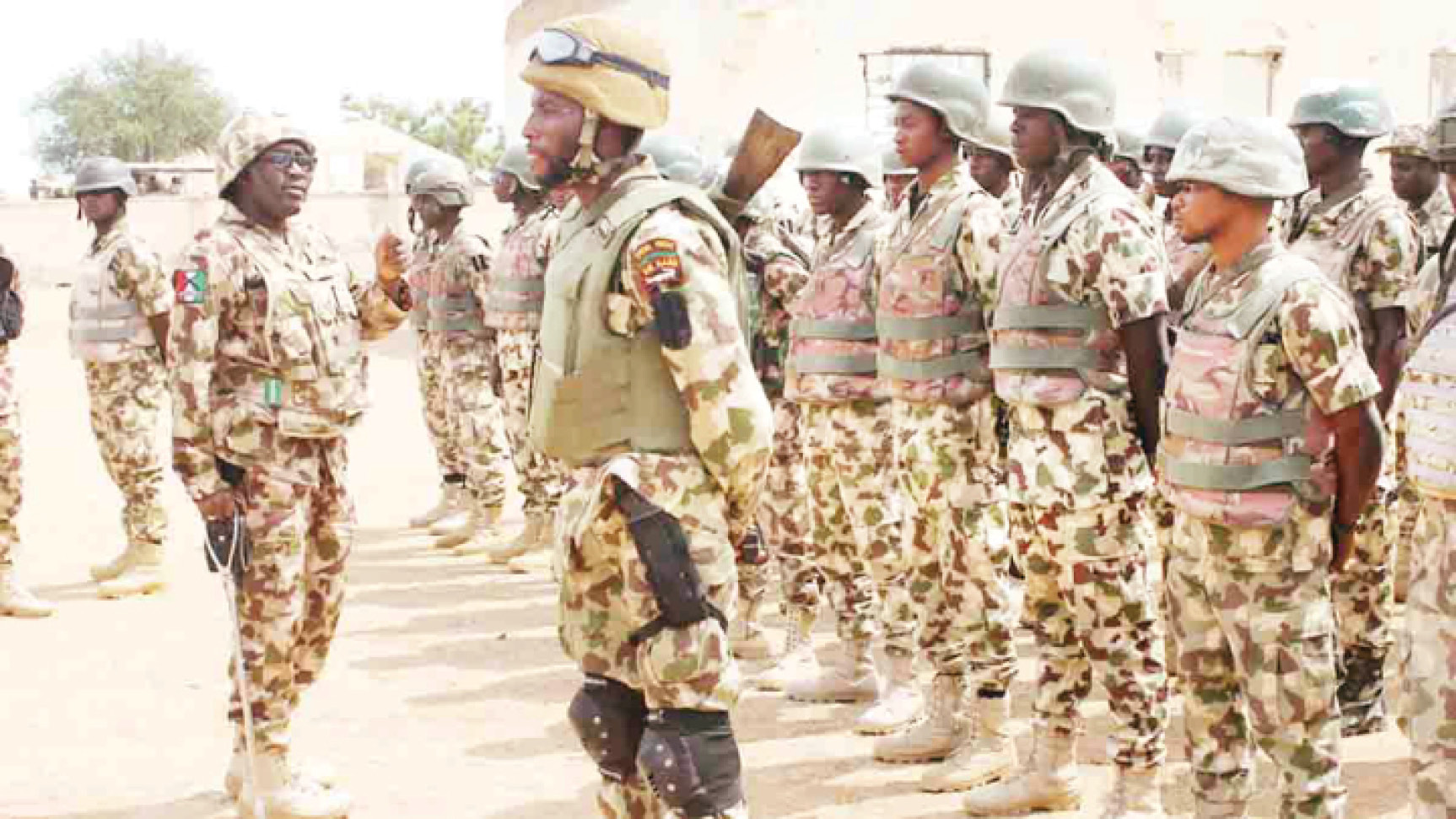Abscondment in the Army
The report last week that the Nigerian Army declared 12 officers and 89 soldiers missing after Boko Haram/Islamic State in West Africa Province (ISWAP) attacks on Marte and Dikwa local government areas of Borno State was unsavoury. A signal dated March 1, 2021, from Operation Lafiya Dole headquarters in Maiduguri, showed that the soldiers, including […]

File photo of soldiers
The report last week that the Nigerian Army declared 12 officers and 89 soldiers missing after Boko Haram/Islamic State in West Africa Province (ISWAP) attacks on Marte and Dikwa local government areas of Borno State was unsavoury.
A signal dated March 1, 2021, from Operation Lafiya Dole headquarters in Maiduguri, showed that the soldiers, including three majors, three captains, six lieutenants, three sergeants and 89 others, were declared deserters as they fled in the aftermath of the attacks.
- NLC to N/Assembly: Withdraw minimum wage bill or face nationwide strike
- 1 killed, 18 abducted, scores injured as bandits strike in Niger again
The signal, signed by Colonel A.O. Odubiyi, on behalf of the Theatre Commander of the Operation Lafiya Dole, partly read: “I am directed to connect Reference A on the above subject and to respectfully forward details of additional officers and soldiers who absconded from the defensive location during the BHT attack on New Marte and Dikwa.
“You are requested to declare the named officers and soldiers’ deserters WEF 19 Feb 21. You are also requested to cause HQ NAFC to freeze their accounts and apprehend/bring them under military escort to this headquarters if seen within your AOR.”
Earlier, authorities of the 7 Division of the Nigerian Army, Maiduguri, had retrieved the uniforms and identity cards of 145 soldiers in Marte town of Borno State, a few hours after seven soldiers killed in an encounter with Boko Haram/ISWAP terrorists on February 14, 2021, were buried.
The soldiers were from 153 Task Force Battalion, Marte and they have been in the area since 2017. They were later moved to Maiduguri and were replaced with troops from the Jaji Military Cantonment, Kaduna State.
But shortly after the story broke, the Army Headquarters dismissed it, describing it as “false, unfounded and an attempt to malign the image and character of the Nigerian Army.”
In a statement last Friday by its spokesperson, Brigadier- General Mohammed Yerima, the Army blamed the report on internal correspondence that was not properly done.
The Army said a good number of those affected later rejoined their respective units and were currently part of the ongoing clearance operations against Boko Haram/ISWAP in the North-East region.
Abandonment of duty post is always of serious concern in the military as this may involve failure to report for duty, which often faces serious charges, whether as Absence Without Leave (AWOL), desertion or missing movement intentionally or out of neglect. They all attract serious sanctions, up to and including the death penalty for desertion.
Nigerians were alarmed by the report of desertion as such could be a dangerous development and a threat to the nation, especially in the face of security challenges facing the country.
We call on the personnel to always exercise patience, even in the face of trials and channel their complaints to the right quarters. Abscondment or desertion is not the answer. They should remember that they took a decision to defend the country, and citizens expect nothing less.
But as Nigerians look up to them for protection, it is also the duty of everyone to support them to ensure that nothing dampens their morale and fighting efficiency. As they face the frontlines in the war against Boko Haram/ISWAP terrorism, banditry and other crimes, everything possible must be done to keep them in high spirit.
The Chief of Defence Staff (CDS) and service chiefs should note that the fight against insecurity cannot be won without the personnel or even a disgruntled workforce, so there should be an investigation into the development to find out the immediate and remote causes of desertion by its men.
They should also take the welfare of personnel seriously. Their mental health is very important and counselling should be provided for those who need it. Also, proper evaluation of personnel should be done before they are sent out on duties. Necessary equipment and fighting gears should also be provided.
